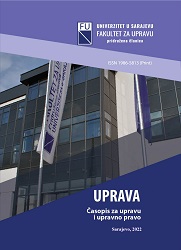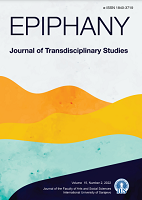
Testing Fiscal Sustainability in Bosnia And Herzegovina
Testing Fiscal Sustainability in Bosnia And Herzegovina
Keywords: fiscal policy; fiscal sustainability; time series; cointegration;
Considering contemporary economic trends and the importance of fiscal policy instruments for ensuring macroeconomic stability, the research focuses on fiscal sustainability. Accordingly, special attention is paid to the empirical approach to fiscal sustainability, where the central question in considering the long-term sustainability of public finances is the concept of intertemporal budget constraint. The potential cointegrating relationships between public revenues and public expenditures, which represent the basic condition for fiscal sustainability, were tested on the example of Bosnia and Herzegovina. Testing the cointegration of time series was performed using the Engle-Granger two-step procedure and then using the Johansen procedure based on the VAR model. Finally, based on the above, the results of the fiscal sustainability analysis of Bosnia and Herzegovina were summarized, which are relevant for defining macro-fiscal goals and development-oriented policies.
More...


